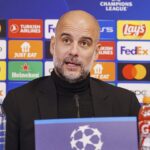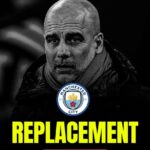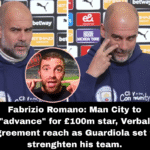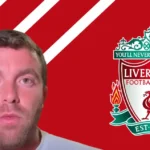Man City ‘plan to advance on’ Kevin De Bruyne replacement as Fabrizio Romano provides major update
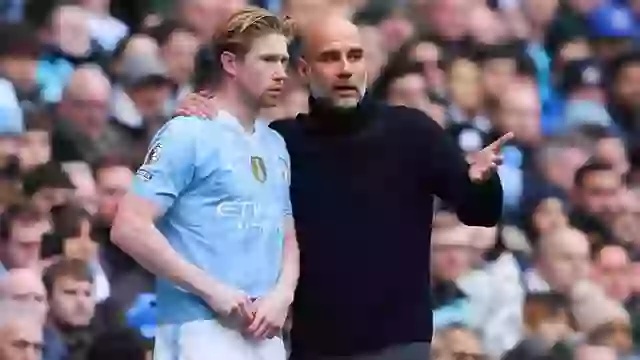
The football world is bracing for a seismic shift at Manchester City as one of the most transformative periods in the club’s recent history approaches. With Kevin De Bruyne’s contract set to expire at the end of the current season, the Citizens face the monumental task of replacing a player who has been instrumental in their unprecedented success over the past decade. According to transfer specialist Fabrizio Romano, Manchester City are now preparing to accelerate their pursuit of what many consider to be De Bruyne’s potential successor, with significant developments expected in the coming weeks.
The De Bruyne Era: A Legacy Defined by Excellence
Kevin De Bruyne’s impending departure marks the end of an extraordinary chapter in Manchester City’s history. Since his arrival from Wolfsburg in the summer of 2015 for a then-club record fee of £55 million, the Belgian maestro has redefined what it means to be a creative midfielder in the modern game. His journey at the Etihad Stadium reads like a fairy tale of redemption and triumph, particularly considering his earlier struggles at Chelsea, where he failed to establish himself under José Mourinho.
The 33-year-old midfielder has been nothing short of phenomenal during his tenure at Manchester City, accumulating 418 appearances across all competitions. This impressive tally represents nearly a decade of consistent excellence, durability, and unwavering commitment to the club’s cause. His contribution extends far beyond mere statistics, though the numbers themselves paint a picture of sustained brilliance that few players in world football can match.
De Bruyne’s trophy cabinet during his time at Manchester City tells the story of unprecedented success. Six Premier League titles stand as testament to his role in the club’s domestic dominance, while the Champions League triumph in 2023 represented the crowning achievement of his career. That particular season saw Manchester City complete a historic treble, with De Bruyne playing a pivotal role in securing the Premier League, FA Cup, and Champions League – a feat that elevated both player and club to legendary status in football folklore.
The Belgian’s most recent contribution came in characteristic fashion, scoring the decisive goal in Manchester City’s Premier League fixture against Wolverhampton Wanderers at the Etihad Stadium. This match-winning performance served as yet another reminder of his ability to deliver in crucial moments, a quality that has defined his career at the highest level. Even as he approaches the twilight of his career, De Bruyne continues to demonstrate the class and composure that have made him one of the most respected players of his generation.
Pep Guardiola’s Emotional Reflection
The prospect of losing Kevin De Bruyne has clearly affected Pep Guardiola on both professional and personal levels. The Spanish manager, known for his tactical acumen and emotional intelligence, has been remarkably candid about the challenge that lies ahead. His recent comments about replacing De Bruyne reveal the depth of appreciation he holds for the Belgian midfielder and the magnitude of the task facing Manchester City.
“I want the best for Kevin, so it cannot be possible to have done these many years without him,” Guardiola reflected, his words carrying the weight of genuine affection and professional respect. This statement encapsulates the unique relationship between manager and player that has been central to Manchester City’s success. Guardiola’s acknowledgment that the club has been built around De Bruyne’s exceptional abilities highlights the systematic changes that will be required to maintain their competitive edge.
The manager’s assessment that replacing De Bruyne is “almost impossible” speaks to the multifaceted nature of the Belgian’s contribution. Guardiola emphasized that it’s not merely about replicating De Bruyne’s on-field performances, remarkable though they are, but also about finding someone who can match his emotional significance to the fanbase and his leadership within the squad. “It is not just the performance, it is what he means to the heart for our fans for many, many years,” Guardiola explained, underlining the intangible qualities that make certain players irreplaceable.
The manager’s reflection on the collective nature of Manchester City’s success – “The success we have belongs to the players” – demonstrates his understanding that while De Bruyne has been central to their achievements, football remains a team sport. However, his honest admission about the difficulty of the task ahead suggests that Manchester City’s recruitment team faces one of their most challenging assignments in recent memory.
The Search for a Successor: Strategic Considerations
Manchester City’s approach to replacing Kevin De Bruyne must be viewed through the lens of their broader tactical philosophy and long-term strategic planning. The club’s recruitment policy under Pep Guardiola has consistently focused on players who can adapt to multiple positions and tactical systems, while also possessing the technical ability to thrive in the manager’s possession-based style of play.
The challenge of finding a De Bruyne replacement is complicated by several factors. First, the Belgian’s unique combination of vision, passing range, physical presence, and goal-scoring ability is exceptionally rare in modern football. His capacity to operate effectively in various midfield roles – whether as a traditional number ten, a deeper-lying playmaker, or even in wide positions – has provided Guardiola with tactical flexibility that will be difficult to replicate with a single signing.
Second, Manchester City must consider the financial implications of their search. The club operates under Financial Fair Play regulations, which limit their ability to spend freely in the transfer market. Any potential replacement must therefore represent excellent value for money while also possessing the quality necessary to maintain the team’s competitive standards. This balancing act requires careful planning and strategic thinking from the club’s hierarchy.
Third, the timing of De Bruyne’s departure creates additional pressure. Unlike previous major departures where the club had time to plan and integrate replacements gradually, the expiration of De Bruyne’s contract means Manchester City must identify, negotiate for, and integrate a new player within a relatively compressed timeframe. This urgency could affect both the pool of available targets and the terms of any potential deal.
Morgan Gibbs-White: The Emerging Target
According to Fabrizio Romano’s latest update, Manchester City have identified Morgan Gibbs-White as a priority target to fill the creative void left by De Bruyne’s departure. The Nottingham Forest midfielder has emerged as one of the most exciting English talents in recent seasons, combining technical ability with the kind of versatility that Guardiola values in his players.
Gibbs-White’s journey to prominence has been far from straightforward. After graduating from Wolverhampton Wanderers’ academy, he spent time on loan at various clubs, including Swansea City and Sheffield United, before establishing himself in the Premier League. His move to Nottingham Forest initially raised eyebrows due to the significant transfer fee involved, but the 25-year-old has more than justified the investment with consistently impressive performances.
The English midfielder’s playing style shares several characteristics with De Bruyne’s approach to the game. Both players possess exceptional vision and the ability to create chances from seemingly impossible positions. Gibbs-White’s capacity to operate in multiple midfield roles mirrors De Bruyne’s versatility, while his age profile suggests he could provide Manchester City with several years of peak performance.
Romano’s report indicates that Manchester City “plan to advance on Morgan Gibbs-White deal in the next weeks,” suggesting that the club’s interest has moved beyond preliminary scouting to active pursuit. The transfer specialist’s assertion that Gibbs-White “remains one of the priority targets” implies that Manchester City have conducted extensive analysis of potential replacements and identified the Nottingham Forest player as their preferred option.
The Complexities of the Transfer
While Romano suggests that “no issues are expected on personal terms,” the negotiation with Nottingham Forest presents significant challenges. The report acknowledges that there is “work to do with Nottingham Forest as they still hope to keep MGW,” highlighting the complexity of securing a deal for a player who has become integral to his current club’s success.
Nottingham Forest’s reluctance to part with Gibbs-White is entirely understandable given his importance to their team. The midfielder has been instrumental in the club’s Premier League survival and their efforts to establish themselves as a consistent top-flight side. His creativity, work rate, and leadership qualities make him virtually irreplaceable from Forest’s perspective, which will likely be reflected in their valuation and negotiating stance.
The financial aspects of any potential deal represent another significant hurdle. Nottingham Forest will undoubtedly demand a premium fee for one of their star players, particularly given the inflated nature of the modern transfer market and Manchester City’s well-documented financial resources. The negotiation will likely involve complex structuring of payments, performance-related bonuses, and potentially player exchanges to reach an agreement that satisfies all parties.
Manchester City’s negotiating position is strengthened by their ability to offer Gibbs-White the opportunity to compete for major trophies and play under one of the world’s most respected managers. The prospect of working with Pep Guardiola and testing himself at the highest level of European competition represents a significant career opportunity that few players would decline. However, this advantage must be balanced against Nottingham Forest’s determination to retain their key asset and their improved financial position following recent seasons in the Premier League.
Tactical Integration and System Adaptation
Should Manchester City successfully secure Gibbs-White’s signature, the process of integrating him into Guardiola’s tactical system will present both opportunities and challenges. The Spanish manager’s approach to developing players is well-documented, with numerous examples of players reaching new heights under his guidance. However, the specific role that Gibbs-White would be expected to fulfill requires careful consideration.
De Bruyne’s influence on Manchester City’s tactical approach cannot be overstated. His presence has allowed Guardiola to deploy various formations and strategies, secure in the knowledge that the Belgian’s quality and intelligence would provide the creative spark necessary to unlock stubborn defenses. Gibbs-White would need to adapt to this level of responsibility while also learning the intricate positional requirements of Guardiola’s system.
The transition period following such a significant change in personnel typically requires patience from both fans and management. While Gibbs-White possesses many of the qualities necessary to succeed at Manchester City, the adaptation to playing alongside world-class teammates and the increased pressure of competing for multiple trophies represents a substantial step up from his current situation.
Guardiola’s track record of successfully integrating new players provides reason for optimism. His ability to identify and develop the specific qualities required for his system has been demonstrated repeatedly throughout his career. If Manchester City do succeed in signing Gibbs-White, the manager’s expertise in player development could prove crucial in maximizing the English midfielder’s potential.
Financial Implications and Market Dynamics
The pursuit of Morgan Gibbs-White occurs within the context of Manchester City’s broader financial strategy and the evolving dynamics of the modern transfer market. The club’s recent experiences with Financial Fair Play regulations have necessitated a more strategic approach to major signings, with careful consideration given to both immediate impact and long-term value.
Gibbs-White’s age profile represents an attractive proposition from a financial perspective. At 25, he offers the potential for several years of peak performance while also retaining resale value should circumstances change in the future. This contrasts with the approach of signing established superstars who may offer immediate impact but limited long-term value.
The English premium in the transfer market adds another layer of complexity to any potential deal. English players traditionally command higher fees due to homegrown player regulations and the perceived value of having domestic talent within the squad. Nottingham Forest will likely factor this premium into their valuation, particularly given Gibbs-White’s importance to their team and his contract situation.
Manchester City’s negotiating strategy will need to balance their desire to secure their primary target with the financial realities of the modern transfer market. The club’s experience in complex negotiations, demonstrated through previous high-profile signings, provides them with the expertise necessary to navigate these challenging discussions.
The Broader Context of Squad Evolution
The potential departure of Kevin De Bruyne and arrival of Morgan Gibbs-White represents part of a broader evolution within Manchester City’s squad. The club has consistently demonstrated their ability to refresh their playing personnel while maintaining competitive standards, though the magnitude of replacing a player of De Bruyne’s caliber presents unique challenges.
This transition period coincides with other potential changes within the squad, as several key players approach the latter stages of their careers. The club’s planning must therefore consider not just the immediate replacement of De Bruyne but also the longer-term evolution of the entire team structure.
The integration of younger players like Gibbs-White aligns with Manchester City’s broader strategy of balancing experience with emerging talent. This approach has served the club well in previous transfer windows, allowing them to maintain their competitive edge while also planning for the future.
Conclusion: A Defining Moment for Manchester City
Manchester City’s pursuit of Morgan Gibbs-White as Kevin De Bruyne’s potential successor represents one of the most significant transfer stories of the current window. The complexity of replacing a player of De Bruyne’s stature, combined with the tactical and financial considerations involved, makes this a defining moment for the club’s immediate future.
Fabrizio Romano’s update suggests that developments are imminent, with Manchester City preparing to accelerate their pursuit in the coming weeks. The success or failure of these negotiations could have far-reaching implications for the club’s competitive prospects and their ability to maintain their position among Europe’s elite.
While the challenge of replacing Kevin De Bruyne may indeed be “almost impossible” as Pep Guardiola suggested, Manchester City’s track record of successful transitions provides reason for cautious optimism. The potential acquisition of Morgan Gibbs-White would represent a statement of intent and a commitment to maintaining the high standards that have defined the club’s recent success.
The football world will watch with keen interest as this transfer saga unfolds, understanding that the resolution could shape not just Manchester City’s future but also influence the broader dynamics of the Premier League and European football. Whatever the outcome, the pursuit of De Bruyne’s successor marks the beginning of a new chapter in Manchester City’s ongoing story of ambition and achievement.
